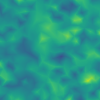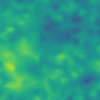Spatial models are used in a variety research areas, such as environmental sciences, epidemiology, or physics. A common phenomenon in many spatial regression models is spatial confounding. This phenomenon takes place when spatially indexed covariates modeling the mean of the response are correlated with the spatial random effect. As a result, estimates for regression coefficients of the covariates can be severely biased and interpretation of these is no longer valid. Recent literature has shown that typical solutions for reducing spatial confounding can lead to misleading and counterintuitive results. In this paper, we develop a computationally efficient spatial model in a Bayesian framework integrating novel prior structure that reduces spatial confounding. Starting from the univariate case, we extend our prior structure to case of multiple spatially confounded covariates. In a simulation study, we show that our novel model flexibly detects and reduces spatial confounding in spatial datasets, and it performs better than typically used methods such as restricted spatial regression. These results are promising for any applied researcher who wishes to interpret covariate effects in spatial regression models. As a real data illustration, we study the effect of elevation and temperature on the mean of daily precipitation in Germany.
翻译:环境科学、流行病学或物理学等各种研究领域都使用了空间模型,许多空间回归模型中常见的一种常见现象是空间混和。当空间指数化的共变模型模拟反应的平均值与空间随机效应相关时,就会出现这种现象。因此,对共变的回归系数的估算可能存在严重偏差,对此的解释不再有效。最近的文献表明,减少空间混结的典型解决方案可能导致误导和反直觉结果。在本文中,我们在一个贝叶西亚框架中开发了一个计算高效的空间模型,将减少空间混和的新旧结构整合在一起。从单向型案例开始,我们将我们先前的结构扩大到多个空间混和的共变情况。在模拟研究中,我们显示我们的新模型灵活地探测和减少空间数据集的空间混和对空间混和的解读,其表现优于通常使用的方法,例如有限的空间回归。这些结果对于希望解释空间回归模型中共变效应的任何应用研究者来说都是很有希望的。作为真实数据说明,我们研究德国海拔和温度对每日降压平均值的影响。










